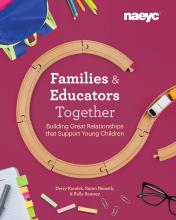Families and Educators Together: Building Great Relationships that Support Young Children

About the Book
-
Creating a welcoming environment for families
-
Providing many ways for families to engage in the program and their children’s learning
-
Ensuring two-way communication and addressing communication challenges
-
Building on learning opportunities families already provide at home
-
Supporting diverse home languages and cultures
-
Collaborating on community-wide efforts
Table of Contents
This section includes sample content from inside the book (PDF).
- Introduction
-
Chapter One: Understanding Family Engagement
- Learn the Six Principles of Family Engagement
-
Define What a Family Is
- Read excerpt: "Identifying and Addressing the Needs of New Residents," p. 7
- Replace Parent Involvement with Family Engagement
- Build Strong Relationships Between Families and Educators
- Get to Know Your Community
- Learn About the Sources of Support for Family Engagement
- Learn About Standards and Requirements for Family Engagement
- Reflection Questions
-
Chapter Two: The Role of Teachers in a Comprehensive Family Engagement Approach
- Participate in Professional Development
-
Contribute to Program-Wide Support for Families
- Read excerpt: "An Orientation 'Encyclopedia' for Children and Families," p. 35
- Reflection Questions
-
Chapter Three: Family Engagement in Action
- Get Started: First Steps to Engage a Family
- Keep the Engagement Going
- Use Continuity of Care
- Be Patient and Persistent
- Count Men In
- Create a Family Space
- Offer Variety So There Is Something for Everyone
- Engage Families as Decision Makers
-
Collaborate on Community-Wide Efforts
- Read excerpt: "Coffee in the Lobby: A Long-Standing Tradition for All Families," p. 54
- Reflection Questions
-
Chapter Four: Communicating with Families
- Establish Goals and Objectives
- Determine How to Invite and Use Information Shared by Families
- Choose Family Communication Formats and Strategies
- Plan Ways to Support Diverse Families
- Ensure Family-Teacher Communications are Reciprocal
- Address Communication Challenges
- Explain Emergency Preparedness Policies and Procedures
- Track Frequency and Quantity of Communications with Families
-
Schedule Periodic Evaluations
- Read excerpt: "Family Communication Planning Checklist," p. 74
- Hold Successful Family-Teacher Conferences
- Reflection Questions
-
Chapter Five: Connecting Home and Program Teaching and Learning
- Use Connections to Support Everyone
- Share Suggested Home Practices with Families
- Provide Activities Families Can Do at Home with Their Children
- Reflection Questions
-
Chapter Six: Partnering with the Community
- Build Relationships with Elementary Schools
- Collaborate with Community Groups
- Encourage Families to Be Advocates
- Form a Program Diversity Team
- Before You Go
- Reflection Questions
- Family Engagement Resources
- References
- Acknowledgments
- About the Authors
Book Details
ISBN: 978-1-938113-45-1
Publish Date: 2019
Related Resources
Online Module
This self-paced online module for preschool teachers focuses on planning, implementing, and observing playful activities that enhance children’s knowledge and skills. Register today!
Online Articles
Climbing Fry’s Mountain: A Home–School Partnership for Learning Sight Words - Teachers at one school found a way to engage children and their families in fun, at-home reading activities. (Young Children, March 2019)
Engaging Extended Family and Friends in Young Children’s Education - This Reggio-inspired lab school experiments with ways to connect extended family and friends to the school’s everyday practices, curricula, and philosophy. (Young Children, September 2018)
Blog
Five Easy Ways to Build Authentic and Genuine Relationships - Here are some ideas you can use to build real relationships with children and families in your program.
Discussion Threads
Hot Topic on Hello: Developing Family Partnerships Using New Communications Tools - In this discussion thread, members share advice on which communication tools to use to engage with families.
Looking for more resources on Family Engagement? Visit our topic page to browse our collection of articles on the topic.
Resources
Recommendations
For Authors & Photographers
Catalog
Webinars
NAEYC Books List
Services
Shop
Enrich Your Curriculum: Purchase the Module!
In the Strengthening Relationships With Families online module, join the authors of Families & Educators Together: Building Great Relationships that Support Young Children to learn the 6 principles of family engagement, along with practical strategies to strengthen relationships with the families in your program.
Derry Koralek is president of DGK & Company, providing early childhood educational consulting to a variety of clients, including teachers and family child care providers. Previously, she served as editor in chief of Young Children and Teaching Young Children and also as Chief Publishing Officer at NAEYC.

Karen Nemeth, EdM, is an author, speaker, and consultant on early childhood language development at Language Castle LLC. She is the author of Basics of Supporting Dual Language Learners: An Introduction for Educators of Children From Birth Through Age 8. [email protected]

Kelly Ramsey, M.S., is a family advocate, leader and consultant at Developing People, Inc. She is a mentor-coach for early childhood programs working towards creating innovative programs for families and children. [email protected]

Reviews
The title says it all! For everyone who works with young children, this essential book is easy to read and well researched, and it includes many family engagement stories that connect that research to real-life experiences. The practical strategies emphasize how children’s learning is enhanced when families are engaged and involved in the process.
—Barbara Kaiser, Consultant, Trainer, and Co-author of Challenging Behavior in Young Children
This is an important book for teachers, coaches, program leaders, family educators, and anyone who wants to build culturally responsive relationships with families. The strategies, resources, and examples of effective family engagement in this book are based on current research and theories on how to build mutual, respectful family partnerships.
—Debbie LeeKeenan, Early Childhood Consultant and Co-author of From Survive to Thrive and Leading Anti-Bias Early Childhood Programs
This valuable resource is a compelling call to action for a strengths-based approach to partnering with families. With examples of effective practice, reflection questions, family engagement stories, and other tools and information, this resource is useful for educators and teacher preparation programs to support a family-strengthening framework for partnering with families.
—Jamilah R. Jor’dan, PhD, Interim Dean, College of Education and Professor, Department of Early Childhood and Bilingual Education, Chicago State University
What is most useful about this book is its accessible blending of child development theory with practical, everyday examples of practice with children and families. It illustrates what respectful, reciprocal relationships between families and staff really look like when done well.
—Valora Washington, Chief Executive Officer, Council for Professional Recognition
This team of accomplished early childhood educators captures the true essence of family engagement, complete with strategies and tools to partner with families. The family engagement stories illustrate creative ways programs work with families and communities. Reflection questions at the end of each chapter propel educators deeper into each topic, making this book a rich resource.
—Linda Gillespie, Family and Infant Development Specialist
Throughout this insightful book, there is a continual thread of building on family strengths and understanding a family’s needs and hopes for their child. It describes how respectful, reciprocal relationships can be established with families to positively impact the development of young children. The authors describe many meaningful and effective ways to engage new families, encourage multigenerational participation, and keep the relationship growing.
—Rebecca Isbell, Early Childhood Consultant, Author, and Professor Emerita, Department of Early Childhood Education, East Tennessee State University
